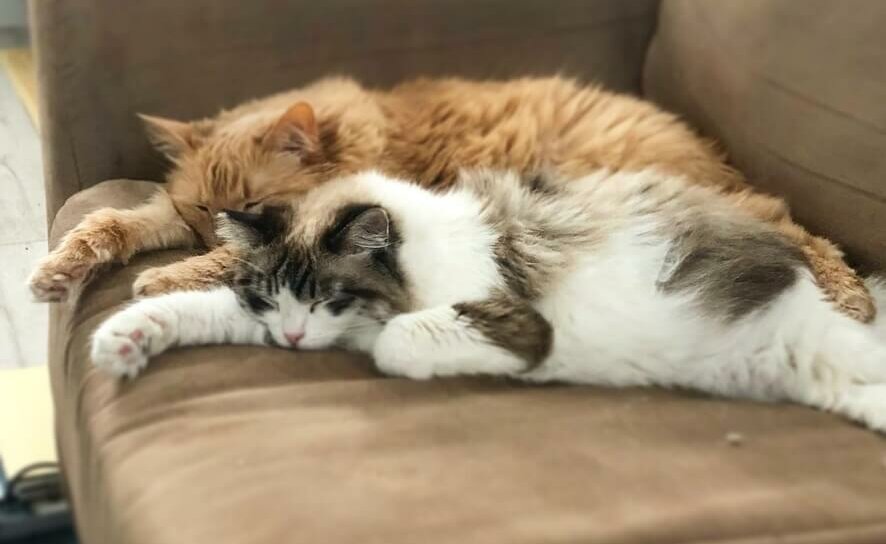Photo Courtesy: Alison Gerken DVM
By:LISA RADOSTA DVM, DACVB
Judy, a stately older woman, sits in my exam room with her cats, Sarah and Stinky. Sarah, a 3 year old calico cat lived as an only cat her entire life. Stinky, a rambunctious, fun loving, 4 month old kitten was adopted about 2 months ago. Judy thought that Sarah was a bit lonely because she slept a lot and played little. Instead of playing with Stinky, Sarah hides under the bed most of the day. She seems to only come out when Stinky is on the lanai or locked in another room. Sarah has started to urinate under the bed where she hides during the day. Judy has fallen into the trap that lots of people do–she thought that her cat would want a friend. How do you know if your cat wants a friend? If so, how do you know how to pick the right one?
Before you can understand what your individual cat wants, you should understand cats in general. Feral cats live in groups when the resources are plentiful and more independently when the resources are scarce. When cats live together, they congregate in related groups of females. Because they live outdoors, feral cats generally have unlimited space and stimulation. When arguments emerge, the cats can get away from each other. When the cats are understimulated, there are birds and mice to hunt. When an adult cat (excluding intact males during breeding season) tries to enter the colony, most often he or she is driven away with aggression.
Now, lets examine what the average person expects of their cat. Indoor cats live in underenriched environments with inadequate space. Owners choose who will live in the house often without consideration for the existing cat’s preferences. How would you feel if you suddenly had a roommate that was not of your choosing? What if that person really grated on your nerves? To make it worse, you have to share not only your seat at the table, but your plate, your toilet and your loved ones! Would you be a little aggressive? Now, hopefully you can understand how your cat feels.
How will you know if your cat wants a friend or will even tolerate one? Look to her current behavior for the clues. What does she do when she sees cats outside? Does she stay calm? Does she run away? Does she puff up and hiss? Her reaction to your new cat will probably be along those same lines. If she is calm, you have the highest likelihood of being able to introduce her to another cat without a lot of drama. If she puffs up, hisses and howls, you might be in some real trouble. Cats who are fearful (puffing up, hissing, running away) probably fare best rooming with a calm, older cat who is unlikely to want to play with them or chase them. Look for a cat who doesn’t mind sleeping on the couch. Cats who are very playful and confident when they see other cats are more likely to get a long with a kitten or an energetic young adult. The new cat will keep them occupied and will be young enough to adopt the rule structure of the older cat.
Now, what about the potential adoptee? Assessing a potential adoptee’s personality can be a challenge. Cats tend to withdraw from the world when they are afraid or uncomfortable. How in the world are you supposed to judge the personality of your potential new cat when she is lying in the back of the cage? You will be better able to assess personality if the cat is living in a foster home. While a foster home is not going to be exactly the same as your home, the foster parent can give you a pretty good description of the cat’s personality and reaction to other animals. If you are adopting a cat from a shelter, try to find a shelter which group houses cats. Group housing involves putting multiple cats together in rooms instead of individual cages at the shelter. Ask the shelter caretakers to describe the personality of each cat that you are interested in taking home. Spend time with each cat that you are interested in. Hold the cat in your lap, handle him and watch him explore the room. Does he have confident body language or is he scared? Does he struggle or does he relax when you hold him? All of these interactions can tell you about his personality. Try playing with him to assess his drive for play. Let him run loose in areas where other cats are caged or in common areas where there are the scents of other cats. Does he hiss when he smells another cat’s scent? Does he spray? Does he just walk by? All of these interactions can give you an idea of his overall personality and reaction to other cats. Just to make the situation even more complicated, keep in mind that some cats will be more reactive in the shelter and some will be less reactive than they will be in your house. Generally, if you like what you see in the shelter using the tests above, you should like what you see at home.
With a little bit of careful evaluation and thoughtful selection, you should be able to find the perfect match for your cat.

